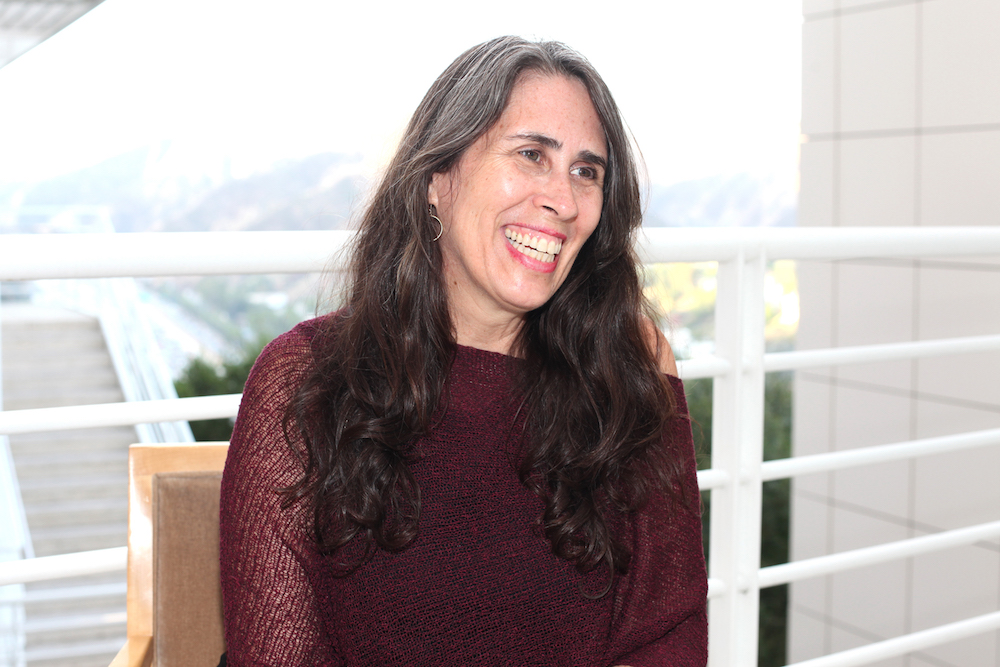
Photo by Aaron Salcido.
Michelle Holmes is the head of partnerships at the Alabama Media Group. Before taking part in a Zócalo/Getty event titled “Is Journalism About Social Justice?” at the Getty Center in Los Angeles, she answered questions in the green room about the super power she wants, where to eat in the fictional Whitman, Alabama, and the giant statue of a Roman god that looms over Birmingham.
How do you get your news?
Twitter. Mainly Twitter, and a couple of news apps.
What time do you first look at Twitter in the morning?
Much later than I used to. So it might be 7 A.M.
What superpower would you like to have?
I would like to have the superpower of being able to magically calm everyone down, including myself. Just a relaxing superpower; like all the people who are so stressed in the world, to just be able to walk up to them and [exhales]. I need such a superpower for myself.
You worked on a documentary called Whitman, Alabama. Where should we eat there?
Well that would be interesting because Whitman, Alabama, is a fictitious place. But Whitman, Alabama has filmed at both Bottega Café, which is an upscale café in Birmingham, and also at a variety of roadside rib joints. I’m a vegan, but I can hook you up with a whole lot of great people who say they’re wonderful.
What’s your biggest pet peeve?
People who look over your shoulder when you’re talking to see if someone better is coming.
You’ve also done work with the Alabama Media Group on sketch comedy. How would you say sketch comedy relates to social justice?
Well, we call it a guerilla effort to help evolve the stereotypes about the South. Our comedy is based on respect, based on kind of the Southern values that we hope can grow—and also some of the ones we hope die out with the generation. So, it’s a fun millennial brand, but really helps bring forward respect, care for families—the things that really are part of the South. So it’s a very light touch, but it’s also one that brings a full spectrum. People are not always looking to grapple with serious issues. Sometimes they want to have fun. And if we can give them fun that has just a touch of something valuable, we feel good about that.
What is it like to let artists in your newsroom?
Wow. It’s simultaneously thrilling and also shattering of all preconceived ideas, like that deadlines will be met. Journalists can be forced to meet a deadline. Artists just won’t. So it’s both really thrilling and can be very slow.
Where are you at your most creative in a group setting?
I am at my most creative in a group of people outside of an office who have shared values, shared goals, and are thinking outside of any of the boundaries that usually constrain us. It’s normally somewhere spontaneous, like a hotel lobby, with people with ideas who are excited and talking about what’s possible.
Where do you take guests when they come to Alabama?
Vulcan is the god of iron and steel, and he towers over Birmingham—as a giant statue of the sort-of industrial might of the South. You can go up inside of Vulcan, so that’s a great place to take visitors.
Who’s a teacher who influenced you?
For a short time, I was on a track to be an elementary school teacher. And finally, finally, in a university setting, I learned elementary math from somebody who actually knew conceptually how to teach math. And I think I was 19 years old, and I thought: Oh my god, I’m not stupid. I’ve just never had a teacher who actually understood numbers and how beautiful they were. It was just a gorgeous experience to really see, oh, this is how children can be taught math who don’t have a natural, linear sort of brain that will get there on their own.



